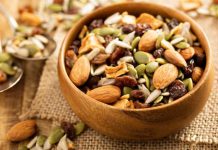Fresh milk is curdled to create curd, which is then allowed to stand for at least 4 hours at room temperature. Curd can be consumed raw, used to make curries and other foods, as a garnish, or added to desserts.
Curd tastes great! Because of its excellent nutritional value, it is a mainstay in every Indian household. It helps with digestion, decreases cholesterol, regulates blood pressure, gives the body the necessary calcium and protein, and improves the flavour of various foods.
A bowl of curd will always be a good choice for a nutritious diet, whether for breakfast, lunch, or dinner. But can it help in losing weight? The answer is yes.
Nutrients of Curd (Dahi)
| Nutrient | Amount per 100g | % Daily Value* |
|---|---|---|
| Energy | 98 kcal | 5% |
| Calories | 98 kcal | 5% |
| Carbohydrates | 4.7 g | 2% |
| Protein | 11 g | 22% |
| Fat | 4 g | 6% |
| Potassium | 141 mg | 3% |
| Sodium | 50 mg | 2% |
| Calcium | 120 mg | 12% |
| Vitamin A | 100 IU | 2% |
| Cholesterol | 15 mg | 5% |
*% Daily Values are based on a 2,000-calorie diet.
1. Protein
Curd has a high protein level of 10–12 grams, depending on the kind, in addition to its calorie count. This is because our bodies growth and development rely on a protein-based diet. Because dry milk is frequently used when making curd, commercially available curds may have more protein than homemade curd.
2. Carbohydrates
The primary sugars found in curd are lactose (milk sugar) and galactose. Bacteria break down lactose during fermentation, yielding glucose and galactose, which are then converted into lactic acid, giving curd and other fermented dairy products their sour flavour.
Since curd has fewer carbs than milk, it is a fantastic addition to a ketogenic diet. In addition, the curd is an excellent dish for folks on a diet because it typically only has three percent of its calories from carbohydrates.
Natural curd contains the least amount of sugar. However, the curd available in supermarkets varies in nutrient and sugar content which at times might harm than do any good. The curd is sold as fruit or flavoured curd and is generally high in sugar content. Avoid these and go for only natural and home-prepared curd for weight loss(1).
3. Minerals
The two main mineral groups you should consume from curd’s mineral composition are potassium and calcium. Compared to milk, the proportion of these two minerals in curd is lower.
4. Calcium
To have healthy bones and teeth, you need calcium. The abundance of calcium in curd allows for quick and easy absorption by the body. Additionally, it facilitates muscle contraction and blood clotting.
5. Potassium
One of the two main mineral groups is the potassium group. Our bodies contain potassium, which aids in the efficient operation of the neurological system and the contraction of muscles. Additionally, it helps eliminate poisons from the cells and transports nutrients into the cells.
6. Vitamins
Riboflavin, Vitamin B6, Vitamin B12, Vitamin A, Vitamin C, and Pantothenic Acid are the main vitamins in curd. These vitamins help your body stay healthy by adding essential micronutrients to dairy products.
9 Reasons Why Curd is Good for Weight Loss
Here are some key characteristics of curd that you should be aware of if you’re wondering how it can help you lose some of the extra weight you’ve been gaining:
1. Enhances Digestion
The irregular removal of waste from our bodies, which can be caused by indigestion or an upset stomach, is one of the leading causes of weight gain. The curd’s living bacteria contribute to better digestion. The bacteria Lactobacillus bulgaricus, found in curd, is in charge of shortening intestinal transit time, allowing waste to be evacuated faster, easing gastrointestinal distress, and enhancing digestion.
Research done at the University of Navarra found that curd helped improve abdominal pain (19%) and deposition scores (16%) in 40 subjects. In addition, the curd’s nutritional composition helped the subjects’ gastrointestinal status. (2)
2. Protein-rich
In contrast to milk, the curd is created through fermentation, which separates the milk solids from the liquid (known as whey), making it more concentrated and higher in protein than milk itself. Since proteins are more challenging to digest, curd’s high protein content is to blame for the slower digestion rate.
3. Calcium-rich
Like all dairy products, the curd is a good source of calcium. A bowl of curd has a lot of calcium, which helps maintain strong bones. However, dietary calcium has additional benefits, including preventing weight gain. A calcium-rich diet may prevent you from gaining the weight you have lost if you have done so in a healthy quantity.
4. Lactose-Free
Regarding weight loss, including milk in your diet would be great for your low-fat eating habits, but because milk contains lactose, a lactose-sensitive person may find it difficult to include it in their diet. Curd, however, is made by fermenting milk, which is accomplished by adding a bacteria called Lactobacillus bulgaricus. These bacteria turn the lactose in milk into lactic acid, making curd acceptable for lactose-intolerant people to consume.
5. Packed with Minerals
You may lose weight due to a hormone linked to increased blood pressure. However, because beneficial minerals like potassium and magnesium make it simpler for the extra water in the cells to depart and quickly reach the bladder, blood pressure levels are maintained.
6. Has Vitamin A
Contrary to widespread opinion, vitamin A does not immediately affect your weight issues. However, it’s possible that eating it will only have indirect effects on weight maintenance. For instance, adding vitamin A can lower your risk of cardiovascular disease, one of the leading causes of weight growth and high blood pressure.
7. Low on Saturated Fat
Curd is a good weight-loss option due to its low-fat content. Saturated fats, single-bond fat molecules often abundant in meat and oils and solid at room temperature, comprise around 1.7g of each 100g of curd dish. Saturated fat consumption is associated with a higher risk of cardiovascular illnesses, leading to weight gain.
8. Fantastic Fat Burner
An effective fat burner, curd might be a staple dish for persons who desire to get rid of abdominal fat and have a flat stomach. In addition, being rich in minerals, especially calcium, aids in weight loss by accelerating metabolism and reducing dietary fats. Increased intake of dairy or Ca contributes to the feeling of satisfaction and helps in reducing dietary fat intake when a person is trying to lose weight. (3)
9. Limits Appetite
Protein is abundant in curd. It assists in reducing calorie intake while satisfying hunger and preventing binge eating. Curd is a great afternoon snack because it is high in protein. You are permitted to eat curd between meals.
According to research, “the more protein in curd, the more it aids in controlling appetite.” GLP-1, peptide YY, and cholecystokinin are appetite-reducing hormones that get a boost with protein intake. On the other hand, it reduces ghrelin, the hunger hormone. (4, 5, 6)
How to increase your intake of curd in a healthy way
Your diet can benefit from the diverse and nutrient-rich benefits of curd. Here are some wholesome ways to work it into your schedule:
- Top it with berries, almonds, and seeds for a healthy breakfast or satisfying snack.
- Include it in smoothies.
- To make spreads, salad dressings, and dips, combine them with herbs and seasonings.
- When making baked products like muffins and short pieces of bread, substitute it for butter.
Curd, a dairy product created when milk is fermented, is high in calcium and, in addition to its many health and cosmetic advantages, can be pretty helpful in helping you lose weight. Simply put, consume curd regularly to lose weight. A bowl of curd will always be a good choice for a nutritious diet, whether for breakfast, lunch, or dinner.
Curd and Weight Loss FAQs
How much curd is good for weight loss?
A daily cup of curd raises your body’s calcium levels, which reduces the release of cortisol and aids in weight loss. Additionally, curd keeps one-third of lean muscle mass, which helps you keep your physique after losing weight for a more extended period.
Does curd help to reduce belly fat?
Curd is a food that is strong in protein and low in carbohydrates, making it ideal for weight loss. In addition, as you lose additional belly fat, the protein in it also aids in retaining lean muscle mass.
What are the disadvantages of curd?
Having curd in excess might lead to weight gain rather than weight loss. This is a very typical curd side effect. Additionally, it may worsen constipation rather than strengthen your digestive tract. Similarly, regular curd consumption might cause pain in those with arthritis.
Which is better, milk or curd?
Both milk and curd are healthy. Curd is, however, more nutritious than milk because it has a high amount of protein and vitamins. Curd can be included in our daily diet as lassi, raita, or curd rice.
What is the best time to eat curd for weight loss?
Curd tastes the finest when consumed during the day. Therefore, according to Ayurveda, curd should not be consumed at night. Eating curd during the day helps reduce junk food consumption as one feels full for longer. However, people with no issues with a cold or a cough can add curd to their meals, even at night. During the day, one could eat curd as a –
- Snack: The low-fat or non-fat variety of curd can be a good snack. One could have curd as a mid-morning or mid-afternoon snack to beat the hunger pangs.
- Before or after exercise: One can have curd before or orter an exercise. The protein in curd helps in building muscle tissues and repairing them.
- Meal: Include curd in your meals as a side dish, or it could be the main ingredient too. Use it for dips or dressings, add it to your salads, or take it as smoothies.
Can curd make you fat or make you gain weight?
Curd will only make you fat once it is sweetened with sugar or flavored with calorie-rich ingredients. Curd is a nutritious food with many health benefits, including improving digestion, boosting immunity, and promoting bone health. Curd is relatively low in calories and high in protein. This makes it a good option for losing or maintaining a healthy weight. However, consuming curd in excessive amounts can also contribute to weight gain. Overall, the curd is a healthy and nutritious food, and it can be an essential ingredient in any healthy diet plan, but consuming too much of it can contribute to weight gain.
References
- Evaluation of the nutrient content of yogurts: a comprehensive survey of yogurt products in the major UK supermarkets – School of Food Science and Nutrition, University of Leeds, Leeds, UK https://www.ncbi.nlm.nih.gov/pmc/articles/PMC6144340/
- A regular curd consumption improves gastrointestinal status assessed by a randomized controlled nutritional intervention – Department of Nutrition, Food Science, Physiology and Toxicology, University of Navarra, Pamplona, Navarra, Spain. https://pubmed.ncbi.nlm.nih.gov/23484542/
- Effect of a dairy and calcium rich diet on weight loss and appetite during energy restriction in overweight and obese adults: a randomized trial – Faculty of Kinesiology, University of Calgary, Calgary, AB, Canada https://www.ncbi.nlm.nih.gov/pmc/articles/PMC3948984/
- Ghrelin and glucagon-like peptide 1 concentrations, 24-h satiety, and energy and substrate metabolism during a high-protein diet and measured in a respiration chamber – Department of Human Biology, Maastricht University, Maastricht, The Netherlands https://pubmed.ncbi.nlm.nih.gov/16400055/
- Critical role for peptide YY in protein-mediated satiation and body-weight regulation – Centre for Diabetes and Endocrinology, Department of Medicine, University College London, WC1E 6JJ, United Kingdom https://www.sciencedirect.com/science/article/pii/S1550413106002713
- Effect of a high-protein breakfast on the postprandial ghrelin response – TNO Quality of Life, Zeist, Netherlands. https://pubmed.ncbi.nlm.nih.gov/16469977/










What is role of probiotics in curd and how they contribute to weight loss. Is there are any studies or research findings related to curd and its impact on weight loss. Include them for further credibility of the article and its points.
Give some tips or recipes on how to incorporate curd into a weight loss diet. It would be helpful for me looking for practical ways to include curd in the meals. It would be great if you could provide resources for those who are lactose sensitive and looking for alternative dairy options.